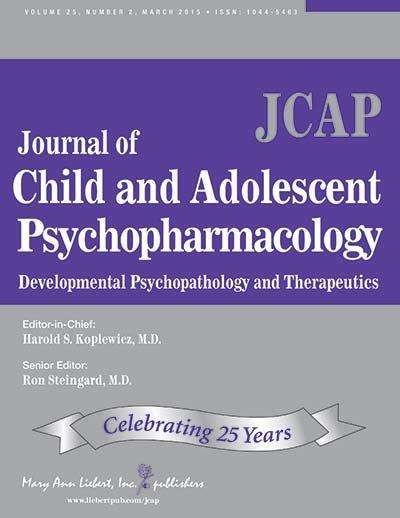New approaches to identify and treat suicidal adolescents focus of JCAP special section

Suicide remains the second leading cause of death for adolescents in the United States. This year nearly 5,000 adolescents will be the victims of suicide and over 500,000 will make a suicide attempt that will require an emergency room visit. New and better tools to evaluate, identify, and treat adolescents at risk of self-injury or suicidal attempts are crucial for the development and implementation of effective preventive strategies. A series of articles authored by leading researchers and clinicians explores key factors that may contribute to suicidal risk and presents new assessment and treatment approaches. The articles are part of a special section published in Journal of Child and Adolescent Psychopharmacology (JCAP).
In the Editorial "New Approaches to the Assessment and Treatment of Suicidal Adolescents," co-editors of the special issue David A. Brent, University of Pittsburgh School of Medicine, PA, and Harold S. Koplewicz, and Ron Steingard, Child Mind Institute, New York, NY, state that "Taken as a collective whole, these articles should give investigators and clinicians hope that, with further work in studying protective factors, etiopathogenesis, and novel interventions, we can save lives and reduce the public health burden of lost years of life to youth suicide."
"Identifying Adolescents at Highly Elevated Risk for Suicidal Behavior in the Emergency Department" presents the results of a prospective study of adolescents found to be at high-risk for suicide on screening. Cheryl A. King, PhD and coauthors report the rates of suicidal behavior two months later and identify possible predictors of acute risk for suicidal events.
Adolescents with a history of suicide attempts, compared to teens that have not attempted suicide, exhibit greater risk-taking in their decision-making style and have greater difficulty predicting probable outcomes, according to study results described in the article "Risk-Sensitive Decision-Making Deficit in Adolescent Suicide Attempters," by John P. Ackerman, PhD and coauthors.
The relationship between suicide attempts and impulsive-aggressive responsiveness is explored in an article by Jeffrey A. Bridge, PhD et al. entitled "Impulsive Aggression, Delay Discounting, and Adolescent Suicide Attempts: Effects of Current Psychotropic Medication Use and Family History of Suicidal Behavior."
Shirley Yen, PhD and colleagues examined the relationship between an adolescent's perceptions of invalidation by family and peers and the risk of suicidal events and self-mutilation, and whether this differs between boys and girls. They report their findings in the article "Perceived Family and Peer Invalidation as Predictors of Adolescent Suicidal Behaviors and Self-Mutilation."
In the article "Dialectical Behavior Therapy for Adolescents with Bipolar Disorder: Results from a Pilot Randomized Trial," Tina R. Goldstein, PhD and coauthors compare the effectiveness of conventional psychosocial treatment with an alternative form of evidence-based psychotherapy known as dialectical behavior therapy in adolescents with bipolar disorder.
Anthony Spirito, PhD et al. present a cognitive behavioral therapy approach for the concurrent treatment of depressed, suicidal adolescents and their depressed parent in the article "Concurrent Treatment for Adolescent and Parent Depressed Mood and Suicidality: Feasibility, Acceptability, and Preliminary Findings."
More information: The articles are available free on the JCAP website until May 23, 2015.



















